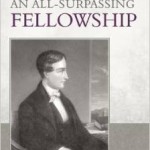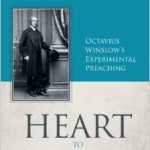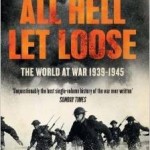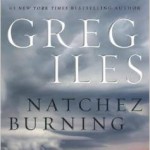I love to read. By God’s grace I am a pretty fast reader; I usually read a couple books each week. I find it helpful to summarize my thoughts on each book and I offer those thoughts in the hope that you will be encouraged to either read or pass over the given title.
 An-All Surpassing Fellowship: Learning from Robert Murray M’Cheyne’s Communion with God by David Beaty. Of all the figures I’ve learned from in church history none has been more pivotal than the young Scotsman named M’Cheyne. So I’ll grant that I’m unusually predisposed to love this book. But, oh what a book it is! I can’t remember the last time I read a new publication and was this affected; tears of gratitude and repentance came from almost every chapter. Beaty is to be commended for simultaneously giving us a masterful biography of M’Cheyne and an unbelievably accessible portrait of his communion with God. Choice selections from original works, letters, sermon, and poems occupy almost every page and Beaty manages to offer it up with cohesive eloquence; a difficult feat from what I suspect is originally his D. Min. dissertation. This book now occupies an exclusive shelf in my study, the “Read at Least Once a Year” shelf.
An-All Surpassing Fellowship: Learning from Robert Murray M’Cheyne’s Communion with God by David Beaty. Of all the figures I’ve learned from in church history none has been more pivotal than the young Scotsman named M’Cheyne. So I’ll grant that I’m unusually predisposed to love this book. But, oh what a book it is! I can’t remember the last time I read a new publication and was this affected; tears of gratitude and repentance came from almost every chapter. Beaty is to be commended for simultaneously giving us a masterful biography of M’Cheyne and an unbelievably accessible portrait of his communion with God. Choice selections from original works, letters, sermon, and poems occupy almost every page and Beaty manages to offer it up with cohesive eloquence; a difficult feat from what I suspect is originally his D. Min. dissertation. This book now occupies an exclusive shelf in my study, the “Read at Least Once a Year” shelf.
 Heart to Heart: Octavius Winslow’s Experimental Preaching by Tanner Turley. Do you know who Spurgeon invited to preach the inaugural sermon at The Metropolitan Tabernacle? Octavius Winslow. He was a giant of 19th century England, but is largely forgotten today. Turley – and Reformation Heritage Books – has done the church a favor in publishing his Ph.D. on the experimental preaching of Winslow. Not only is this work a useful introduction to a spiritual giant of centuries gone by, but a fabulous introduction to a philosophy of preaching neglected today: experimental preaching. Joel Beeke, one of the foremost experimental, or “experiential”, preachers of our time defines this philosophy as preaching that “addresses the vital manner of how a Christian experiences the truth of Christian doctrine in his life.” Turley argues for the following eight characteristics of Winslow’s preaching: doctrine, Christ-centeredness, discrimination, interrogation, illustration, persuasion, and exhortation. Although I found the treatment to be somewhat anachronistic in places,1 I believe any preacher today would profit from its salient points.
Heart to Heart: Octavius Winslow’s Experimental Preaching by Tanner Turley. Do you know who Spurgeon invited to preach the inaugural sermon at The Metropolitan Tabernacle? Octavius Winslow. He was a giant of 19th century England, but is largely forgotten today. Turley – and Reformation Heritage Books – has done the church a favor in publishing his Ph.D. on the experimental preaching of Winslow. Not only is this work a useful introduction to a spiritual giant of centuries gone by, but a fabulous introduction to a philosophy of preaching neglected today: experimental preaching. Joel Beeke, one of the foremost experimental, or “experiential”, preachers of our time defines this philosophy as preaching that “addresses the vital manner of how a Christian experiences the truth of Christian doctrine in his life.” Turley argues for the following eight characteristics of Winslow’s preaching: doctrine, Christ-centeredness, discrimination, interrogation, illustration, persuasion, and exhortation. Although I found the treatment to be somewhat anachronistic in places,1 I believe any preacher today would profit from its salient points.
 All Hell Let Loose: The World at War 1939-1945 by Max Hastings. Sir Max is, for me at least, somewhat of a maddeningly brilliant historian. Every work of his I’ve read possesses pointed reflection and countless individual stories that give the events of old a movingly personal dimension. Hence, the brilliance. Yet, those same works also seem strikingly slim on cohesion of narrative. And All Hell Let Loose is no different. The whole book seems to operate in the following fashion: historical statement, summary, or insight followed by a personal vignette of said history. Rinse and repeat the process for hundreds of pages. Hence, the maddening part of his brilliance. I have Hasting’s Winston’s War on my shelf and it’s crying for attention. It remains to be seen if the first prong of his “maddening brilliance” will keep me away for a while, of if the latter facet will lead me to open it up next week.
All Hell Let Loose: The World at War 1939-1945 by Max Hastings. Sir Max is, for me at least, somewhat of a maddeningly brilliant historian. Every work of his I’ve read possesses pointed reflection and countless individual stories that give the events of old a movingly personal dimension. Hence, the brilliance. Yet, those same works also seem strikingly slim on cohesion of narrative. And All Hell Let Loose is no different. The whole book seems to operate in the following fashion: historical statement, summary, or insight followed by a personal vignette of said history. Rinse and repeat the process for hundreds of pages. Hence, the maddening part of his brilliance. I have Hasting’s Winston’s War on my shelf and it’s crying for attention. It remains to be seen if the first prong of his “maddening brilliance” will keep me away for a while, of if the latter facet will lead me to open it up next week.
 Natchez Burning by Greg Iles. Before picking up this book I had only read one Greg Iles book and it didn’t go so well. But when Stephen King proclaims a book to be “extraordinarily entertaining and fiendishly suspenseful; I defy you to start it and find a way to put it down,” I feel my literary senses challenged to a duel I cannot refuse. So I bought the book. And Mr. King’s superlative defiance is well founded, this book is marvelous. Natchez Burning is set against the dark racial tensions of Mississippi in the 1960s, tensions that span all the way into 2005 when the protagonist’s father is accused of murder. The murder sets in motion a series of events that the last four decades have managed to suppress; a series of events Iles plans to cover in a projected trilogy (with Natchez Burning being the first volume). I’m still astounded how Iles leaves most of the plot lines open, but resolves just enough of the storyline to not offend the reader’s need for some finality. It took Iles five years to write this book and I can only hope the trilogy’s second offering arrives much, much sooner.
Natchez Burning by Greg Iles. Before picking up this book I had only read one Greg Iles book and it didn’t go so well. But when Stephen King proclaims a book to be “extraordinarily entertaining and fiendishly suspenseful; I defy you to start it and find a way to put it down,” I feel my literary senses challenged to a duel I cannot refuse. So I bought the book. And Mr. King’s superlative defiance is well founded, this book is marvelous. Natchez Burning is set against the dark racial tensions of Mississippi in the 1960s, tensions that span all the way into 2005 when the protagonist’s father is accused of murder. The murder sets in motion a series of events that the last four decades have managed to suppress; a series of events Iles plans to cover in a projected trilogy (with Natchez Burning being the first volume). I’m still astounded how Iles leaves most of the plot lines open, but resolves just enough of the storyline to not offend the reader’s need for some finality. It took Iles five years to write this book and I can only hope the trilogy’s second offering arrives much, much sooner.
Click here to find other entries in the Recent Reads series.
- For example, the employment and citation of Paul Tripp’s language of behavior modification versus heart transformation is out of place. Would Winslow agree with this rubric of sanctification? Most definitely. But such imposition of modern categories on older divines is, in a word, anachronistic. ↩
